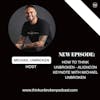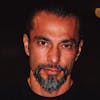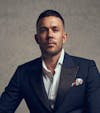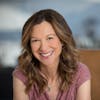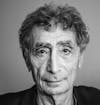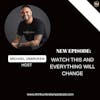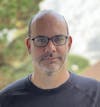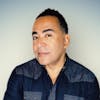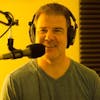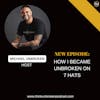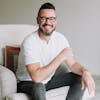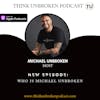E106 Overcoming Addiction Through Yoga with Cole Chance
In this episode, we have a guest speaker Cole Chance. She is a yoga teacher, instructor, and educator who I've known for quite a long time, who actually played a pivotal role in my healing journey.
We talk about her own struggle through addiction, alcoholism, abuse, and getting to this place in life, where she was using her power to heal and to transform not only her life but the lives around her, through the power of yoga and my own experience with yoga.
Learn more about at https://www.ThinkUnbrokenPodcast.com
In this episode, we have a guest speaker Cole Chance. She is a yoga teacher, instructor, and educator who I've known for quite a long time, who actually played a pivotal role in my healing journey.
We talk about her own struggle through addiction, alcoholism, abuse, and getting to this place in life, where she was using her power to heal and to transform not only her life but the lives around her, through the power of yoga and my own experience with yoga.
Learn more about at https://www.ThinkUnbrokenPodcast.com
Support the Podcast: Become a listed sponsor!
Follow me on Instagram @MichaelUnbroken
Learn more about coaching at https://coaching.thinkunbroken.com
Get your FREE copy of my #1 Best-Selling Book Think Unbroken: https://book.thinkunbroken.com/
Hey! What's up, Unbroken Nation! Hope that you're doing well, wherever you are in the world. I’m Michael Anthony – author speaker podcaster and advocate for adult survivors of childhood trauma, and you of course are listening to the Michael Unbroken podcast.
Today, I am greeted by my amazingly, dear friend, Cole Chance. Cole, how are you?
Cole: I'm so well, I'm so good. Hello from Australia.
Michael: Hello from down under. I'm stoked to have you on listeners, may not know this you and I have been pals for a while. Now, the world through serendipity made our paths cross, when I discovered you on your YouTube many, many moons ago, but before I dive into that, can you tell everybody a little bit about you?
Cole: I am a lot of things. I am a yoga teacher. I'm a world traveler. I am an alcoholic in recovery. I am currently living in Australia, and I work with teacher training and retreats around the world and with the focus on helping people find more freedom from addiction.
Michael: It's really beautiful. I mean, I love your mission. I love your journey. I found you online many moons ago. As I said, when I was in the midst of this healing journey, where my body was very much broken down from the way I had treated it from drugs and alcohol, and on top of all the abuse that had been through, and I remember like the first time I watched you, one of your videos filling like, I don't know why, but I think this person understands what it's like to be a human being inside of a human body as opposed to a lot of yoga practitioners, and I'm not shaming anyone, so let's be very clear. We feel very robotic, which I think is kind of my experience of doing yoga now for going on 12 years and very much experience as I've done it around the world. I guess really a jump-off point. What was it that led you down this path? Because yoga I find in my own journey and experience has been this extremely not an only healing tool for me, but it always helps me kind of find my center in the universe. How is it that it found you or vice versa?
Cole: Well, I think that I was very off-center whenever yoga found me. I guess I'll say I took my first yoga class in a drug-and-alcohol treatment center. Probably, I don't know ten years ago or something, really fortunate for it to have found me, so I was on like a rehab tour in my 20s. I was in and out of rehabs a lot and only a couple of them this is the first treatment that I went to the 10 yoga in it and I was so disconnected from my body and just and for myself and like, all the different levels and they introduced me to yoga and just the simple movements and the breath, you know, yoga means unity literally and just bringing back these little pieces much less about the shapes, but just about focusing on my breath or left hand to right foot like all of these things that are seemingly really simple, were not, it's like, simple, not easy.
So, whenever these practices were going to introduce to me, not only did I see the juxtaposition of where I was versus like, oh, this is how it could be, but it allowed me to silence the noise outside as well. Like, on this mat, I couldn't distract myself, it was just me and me and slowly, I began to on my yoga mat. It became a safe space for me and got to know myself and that might sound simple, but it's quite profound. So, yoga found me through my diction and help me out of it.
Michael: Yeah, I love what you said and that was so much of my experience to being I started I don't know if you're familiar with it, but I got serious about yoga through this thing called DDP Yoga, which is Diamond Dallas Page, who is this professional wrestler, which is yeah, hundred percent, which is a thing that I connected with because I love wrestling as a child, and I loved him, and I was just like, oh, wait, identify masculinity with like this thing, and I would go and be literally the only male in a yoga studio, at that point, being way overweight, an excessively intimidated, and just, and it was a different time, right? I mean, it's very different than yoga now, and feeling like I couldn't connect, but in that room and that space and then on my match, similarly, I had this experience discovering my body because I like you was so dissociated my brain and my body were on two, totally different fields, and it's been a real long time, like consuming self-medication to keep it that way. As you were stepping into this discovery that you had with yourself, what was that like?
Cole: It was terrifying and hopeful at the same time, like terrifying in the fact of realizing how far away that I was from myself and actually grew up playing sports, I was very in my body growing up. So it kind of I had that baseline a little bit and realizing like, how far gone I was on so many levels and like, oh this, this could be my anchor or like my safety rope as well. So at the same time as it is yeah, just like, incredibly scary. It was hopeful as well and it wasn't right away, they didn't just like it would be nice to just say like I did yoga that first time and it was all over. What happened is that I wasn't ready to get sober yet, let's just be super honest, is that I didn't want to get sober. I wanted to find a way to do it, right. I wanted to find a way to drink and to use drugs, right. So that I didn't end up in jail or end up in rehab again, which is what was happening. I was obsessed with that, as you know, as many people can probably relate to if you have a similar story that so what I did is I left this rehab and I told myself like there's something for me here. If I ever get sober and in that same thought I remember going, if I ever get sober, but I'm not going to, but if I do, I'm going to come back to this. And so I kind of bookmarked it and I went back out for another six years of just whirlwind chaos, but throughout these six years, if I had a break and I had like some sanity and a little bit of, you know, more functionality, I would go into yoga and more and more towards the end slowly I was creating slowly it was becoming like the only space where there were moments of silence and stillness. And so, even though it was far and few between I was building and cultivating the safe space that I could keep coming back to, and every time I came back to my mat, it would be like, My God, like big, exhale and like okay, and then that same feeling of the terrify and hopeful would come back, and a lot direr as it went on, like, oh my God, I can't keep living this mat.
Michael: Yeah, and I don't want to put words in your mouth obviously, but I'm so curious. If your situation was similar to mine in that those moments being on the mat, felt like the only true sense of control that I had, because I recalled, just spending so much time in the chaos that I thought I was controlling right? Because like, I was thinking like, how can I just get trashed every night and then get like have this sense of normality and it wasn't true because my life was out of control and then being in that moment and looking at in recognizing I get to control everything that's happening at this moment. I found a sense of peace. How’s tomorrow was that to your experience?
Cole: Yeah, I think that you know and to touch on what you said about how we're trying. We're so out of control, not only are we out of control in our addiction, but we're obsessed with the controlling, so we don't have it, but we're obsessed with getting it like how much energy expenditure or we putting out making sure we have enough, that we don't smell like it, nobody knows that, you know, everything is spent on trying to control it, but it's not happening and that's exhausting.
So, yeah, on the mat there's this sense of I can choose, it's empowered choice of like I can just lay here in child's pose or I can move my body, I can stay in this pose even though it's challenging like getting to kind of set the rules and set the parameters was incredibly refreshing. Yeah, I agree.
Michael: Yeah, there's something about them, I guess I would say the control of having the ability to set boundaries within yourself that is almost in a sense.
Here's what I thought, because, at one point, I challenged myself. I'd kind of just hit this, this flow with it. Right? And I decided to do a 30-day Hot Yoga Challenge. And as I was in the midst of it, I was like, you know what? Let me see how far I can really take this, and I ended up doing 66 straight days of 90 minute, hot yoga classes, and I got to this point somewhere in the middle of, it was just riding this wave, because of two things, one, I'd never been that sober that long and to it felt like my body and my brain were at once, finally connected, like I was working through this dissociative experience that I had, you know, you mentioned the word hopeful and that's what I felt in that moment. I was like, I feel hopeful and a sense of joy and pride in it all so that I can like reach this threshold with this experience, how much of that word was powerful for you because I think about the Power of Words and especially when it comes to the way that we think about ourselves in the world, what kind of role did a word like hopeful play in this for you?
Cole: Well, in yoga, it was about the only thing that I had that word even like resonated in because I was a chronic relapse. Nobody thought I was going to get sober, everybody thought I was getting ready to die. Everything I would try. It was like try and fail, try and fail, try and fail. Hey! It wasn't working, rehabs weren't working, the hospital's detox I'm leaving all of them, there wasn't much hope, there wasn't much off going on, not for me, or anyone around me. And on the mat, that's where I found it, little tiny sparks of hope. You know, one thing that I really recall is learning the first in my first yoga class, that the teacher at the treatment center, the teacher tell me what Namaste meant and I heard it before but I didn't really know and she said like my higher self sees your higher self and I was like, hold on, I have a higher self like I didn't know that and like just that thought was like, oh, okay, my old stories that I'm bad like I just like a buck up, I was just like I was just bad all the time.
So this idea of like, oh, I have a higher self. I can choose to act out of this higher place, like what would the best version of we choose. So that kind of ties back into that hopeful feeling of reminding myself. So the yoga and the breath, and the stillness, and the calm, and the choice reminded me that I can do something different. I can don't have to do the thing I always do.
Michael: Yeah, and there's also an intrinsic challenge to that, right? Because you are faced with that moment of understanding a reckoning, right? And I recall these numerous moments in my life one that I've been talking about recently, is I remember sitting on my bed, eleven o'clock in the morning, weighing 350 pounds, eating chocolate cake, watching the CrossFit Games, and thinking to myself, like, if this isn't Rock Bottom, I don't know what it is. And in that, coming to the realization that I had a choice to make that there was accountability to be had to myself, and I think often people view yoga like this, I can let go and just exist in the world and not have to challenge myself to it, but I found through my own experience that it was an immersive challenge in mind, body, spirit, and soul. And so what I'm really curious about as, as people are stepping into this, whether they're new to yoga, they have no idea about it or they're deep into this, what role effectively does, challenging yourself in yoga play?
Cole: You know, really, and actually a really big role, and it's interesting. It’s always a juxtaposition here, but so top us is, is one of the NeoMas, so that NeoMas, essentially, as the yoga Ten Commandments. This is what was in the philosophy in the Yoga Sutra from a long time ago. And one of them is tapas, which means discipline. I didn't like that word that didn't resonate with me at all, but it's learning, like how can we use the discipline in this fire towards ourselves, like, how do we stand up for ourselves to ourselves for ourselves? And it's really asking us to push into our edges to lean into discomfort not just out of the sheer sake of discipline or self-flagellation but to create a framework for more freedom, and that's really what we're after like, how can I use my choices and my decisions to do the harder thing? Because it's going to bring me more ease because it’s the right thing.
So I really kind of see Tapas as this it symbolizes fire a lot of like fire transformation. Like how do we push into discomfort? I think that kind of like framework for freedom and setting that up, but the catch is that Tapas isn't always the fire, isn't always the push, sometimes it's the pullback. So if we have the tendency, okay. I know that. I know that I've heard that, maybe you have this tendency of overworked, a tapas could be to pull back a bit. So a tapas is doing the harder thing and when we do the harder thing, it's like it's that the fire.
So Tapas can be to pull back when you need to or it can be to push forward. So we're always constantly challenging ourselves, challenging our habituation that our conditionings.
Michael: Yeah, one of the biggest challenges that I've had probably in the last six years was taking seven days off and doing nothing and it was, it was literally one of the hardest things I've ever done because I measure this against the idea of creating this pathway to the life that I want to have 30 years away, and I think, and I have to remind myself in these moments, like, I am not necessarily a workaholic, right? Which I think is really easy to step into when you've been faced with addiction, because I always give myself space and I have parameters, like, I don't work on Sunday for instance, right? And thinking about this place that we move towards making our self uncomfortable in that moment having the clarity of thinking about the way that I wanted to position and step myself into 2021 being about clarity and intention, and had I not have that break not getting there because I recognize that I needed to push myself into the place of being uncomfortable, in order to grow. What I'm curious about in your story and your growth. What was it about being uncomfortable through discipline that created change in your life?
Cole: It was the having to rewrite everything, everything that my brain knew, that my body knew, that my tendencies was an uphill battle, to say the least, and I think that on my yoga mat, I learned to build capacity. So we think about the window of tolerance like wanting to, to build the capacity of where I can be, not too far out on either side. It's not only about figuring out where you can be in the middle, but it's about how you can expand that capacity to be in bigger places. I don't know if that makes sense.
So yoga really helped me be able to be in the challenge, to be in the heat to breathe through it, to remind myself that I'm safe that I can just like, I can come down if I need to, I can push harder if I need to and I think it's really a reminder of choice, a reminder that I can choose to do this. I can come back, but I'm going to push forward. I'm choosing to push forward. I think it does come back to choice.
Michael: Yeah. There's so much that has to be said about choice because we often lose our understanding that it is within our capacity to be able to have agency over the things that happen in our lives, and especially when we are in the midst of what I would call, The Vortex of spiraling down to the bottom of the deepest darkest places of ourselves. We often forget the idea that choice still despite that chaos exists. What I'm curious about is what capacity, so assure on this in your you're stepping into yoga and you're seeing changes happen in that matt and I'm sure in the way that you're talking to yourself and the way that you're showing up in the world like how did your world start to take shape as you stepped into discipline and challenging and pushing yourself to understand something about you that you had not known previously?
Cole: How did my world begin to change? I was so disconnected in terms of knowing what I liked, what I didn't like, my values, what did I think about this social issue or this moral issue? And I was learning to know myself, learning to know the tendency of my mind. I think that there are so many different things that everything that happens on the mat happens off the mat. If I notice the way I'm talking to myself when I'm having a bad day. I noticed the way, maybe I'm blaming the teacher for leaving me in chair pose or whatever, like tendency to blame tendency to self criticize like noticing the tendencies of our mind in a place that on, you know, not loud that I can hear began to notice how I was doing that off the mat and I think it's just really metaphorical. So things begin to shift on the outside of my life. It's like whenever I wanted to just say fuck it like, I'm upset it, at the job or my boss or whatever it is, knowing that I can just take a few breaths and I can handle this. Like I can deal with this and allow in my capacity to be bolder and to be bigger and reminding myself to take a pause before I react, a pause, before I take the drink, to kind of think things through and again remembering that, you know, taking that top as a black doing the harder thing taking that off the mat. I mean, that ships, everything.
Michael: Yeah. I mean I couldn't have said it better myself. I mean that feels like such a reflection of my own experience and many times looking at and recognizing like oh my parasympathetic and sympathetic nervous systems are so incredibly out of whack, that the only way I can come back to any semblance of the center is in these moments of controlling my breath, controlling my disc, controlling what is happening in my life. You know, as you got more of that control over your life. How did that impact just like the way you talk to yourself in the way that you thought about yourself?
Cole: Yeah, absolutely. And I think that what really happened for me is that I was able to see the space in between my voice or the self-talk, the thought, and myself, realizing that I wasn't my voice like my brain was just being shit to me, my thoughts were happening but I wasn't necessarily that, like, I could notice, like, I'm going to do this today, I'm not going to treat myself like this today. When before I didn't realize that, like I had a choice about it, but I can be like, Nah, not doing this today. So being able to have that little bit of a gap in the beginning to separate, I think was massive for me.
One thing that my teacher says a lot is like, you know, our eyes, see, our ears hear, no smells in our thoughts, our mind thinks that's what it does it just thinks but you get to choose, whether you're going to jump on the train with that thought, or you just let that train car go by. And that was so big for me because I didn't know that I could jump on or jump off like I thought I was just on it with whatever was happening. So that was really big for me.
Michael: What do you think was the biggest call it reframing that you had in the understanding of who you were?
Cole: Wow! Gosh! I just feel like I just, I almost feel like a completely different person, but then I'm also exactly so the same, I can close my eyes and just feel like, wow, gosh like I'm still there. I think the biggest I never knew was how much possibility that I had. I never imagined myself. I never knew I had one iota of business sense in me. I never traveled outside of the states. I actually didn't know what was possible if I like got out of the end of a bottle. So just realizing the possibility that I didn't have to stay on that same track. It's like, I had horse blinders on. It wasn't like, I knew what I wanted and I just couldn't get it. It's like I didn't know what was possible. If you would have asked me in the beginning like you can have anything you want. You know, what do you want, and we'll give it to you? I would have sold myself so short because I actually didn't have the language for it. So I think, what really opened up was being able to understand the possibility and that I didn't have to know it's like leaving the room, leaving space for like a known possibility. Like being able to say, I don't even know what it is, but there's something out there.
Michael: Yeah, that's really beautiful. You have to be curious about it in my experience. It was very much about like, hmm, I wonder what's on the other side of this thing, that feels very uncomfortable and very difficult. So what I'd love to know, I'm listening call Michael, this is great, seems to work for you guys, you're special, you're clear, you know, something that I don't know. I don't know where to begin with this process. I always hear yoga. I always hear meditation, always hear about getting in touch with my body and reframing and learning and growing it, but I don't get it and I'm scared of it. I'm nervous about it, like where do I begin to actually step into this?
Cole: I think that we have different entry points, which is fine because we're all different. So I think trying to do it exactly as somebody else does, isn't the way to go? Emulation is great, when we don't know what we're doing, but exactly emulating on isn't always, isn't always the way to go, but just starting somewhere whether you want it to be yoga or journaling or may be coming up with some sort of dedicating a little bit of your energy to something because you dedicated it a lot to whatever it is that, you know, whatever it is that you're wanting to shift.
So, just a little bit and dedicating, just a little bit and making it sustainable and then, just adding those up, adding it up day today and you're like, and then this 2, and this part 2, and that begins to create a shift, and create something different, creating a new groove.
Michael: Yeah, and I think that's what it's to, right? This process seems so secular, and it's like, at some point, you have to remove yourself from the spin cycle and take a step back and look at it, unbiasedly and without shame and without guilt and kind of say to yourself. I need to at least try something, and I think about this often my experience and so many others in that moment of like recognizing that they needed more a coach, therapy, God, whatever it was, yoga, often comes from this place of rock bottom and what I'm constantly looking at and now knowing that you are working with people who are in this position and you've seen it from both sides of being healthy, and not. What I'm curious about is, how do we mitigate the risk of rock bottom and empower somebody with tools to be ahead of the curb? What do you do there? I mean, is it even possible?
Cole: Absolutely! As people get off the ship and lots of different places, you don't have to go to rock bottom, many people do. I think it really has to do with getting brutally honest with ourselves because we are good at denial. We are so good at denial. It's actually the lowest energy like calorically for our brain, it's the lowest energy fix, it actually takes the fewer calories, just to deny, rather than have to mitigate challenges. Always, like when they talk about children, like, you'll see it in children. It's the first thing that children's learned, they'll have like cake all over their face and be like, I didn't eat it like I didn't do it. But actually, it's the easiest thing for us to do in our bodies always looking for the easiest route. So I think that getting brutally and compassionately, let's do that brutally and compassionately honest at the same time, they can live together about where you are, what this is affecting, how it is affecting you, how much energy you are, just exhausting because I think what happens is why we don't get off prior is because we deny our way into thinking that we've got it under control, will minimize, will rationalize. I was a big denier but had I been able to absorb and honestly been like, oh my gosh, and like just really looked around me. I would have gotten off earlier, but I wasn't able to do that.
Michael: Yeah. I mean, I'm in total agreement with you. I mean, I think about it from a trauma scope, right? Just pushing it down and pushing it down and pushing it down and hiding from it, and then watching my life, be disastrous for a very long time, and people being like, you're an emotional recluse, are you a sociopath? Do you have any capacity to be a human being? And we just denying my thing isn't impacting you, my emotional response, doesn't matter, the way I think, act, feel, breathe, whatever is only about me and me alone and thinking about, man, if I would have, just, I had a mirror moment. I shared that with you before this audience knows about it, just looking at it, and saying; ‘From this moment forward, you're going to do, whatever it takes to change your life and being constantly in that place now, ever since of viscerally brutal honesty with myself but I love what you said. There is an element of compassion that exists in my life for me, that does not exist in any other plane because where I, as once used to be more mean and difficult and trying and uncouth to myself, and now find myself being just the polar opposite. This journey so much is about getting to that place and I think also it's a part about, how do you step into acknowledging that you need help? And what I'm wondering is in this journey and this place what role does asking for help play not only in your life but in the people that you work with?
Cole: Its massive because we can't. It's so hard to fix something with the same mindset. It's like you need to have reflection and mirrors and see different perspectives, and it's really challenging to even know what you have on sometimes to be able to switch them. So it's so important to be able to ask for help and this can be really scary. We don't know, things may not have went well, you know prior to asking for help, you know, we're vulnerable when we ask for help. So a lot of people that place a vulnerability could not have went well, so it's finding the spaces that you can feel again finding these relationships and the spaces that you can feel safe in, treatment can be helpful, therapy is so can be so vital, coaching figuring out what it is, but creating these spaces where you can have the secure attachments and really be seen and be heard. I think are so important. And I think it's also about being discerning about where we're asking for help especially coming from out of the vulnerable situation.
Michael: Yeah, and I think often and my experience, especially in, you nailed it. As we had found, we come by it honestly that asking for help often led to ramifications, and you know, the one thing that I've come to discover is that asking for help is actually the strongest thing that we can do. I mean, there's a zero percent chance, I'd be sitting here having this conversation with you, had it not been me and multiple different parts of my life being like, Oh, I need a resource. I need help, and I mean, even that's how I discovered you on YouTube. God knows how long ago, but it was like, I need something else that my brain cannot compute, and I think you hit that right on the head. As we start to wrap up here. I want to definitely give you some space, tell me a little bit about what you're working on right now.
Cole: Well, what I'm working on right now, I kind of do lots of different things but in the terms of using my experience for… You have to give some hopefulness back to that word hopeful is I'm working on a program called emerge that I created, and it's a group inquiry, it's a self-inquiry, but is supported by the community, and we really go in and we get down into the honesty and really digging in and seeing be real with what's going on and it's just amazing how we can hide from ourselves, and I think that's just a really, really beautiful to be able to do this in the community because then, someone else will share in your like, oh shit, me too, like, damn it, and we can really reflect these for each other.
And one thing that I just wanted to mention about that is one of my teachers Pema Chodron, she talks about always like going, she's always talking about going into discomfort and going into our walls, but she does say but we don't go after our walls with a sledgehammer like you go there but you do, you know speaking to that kind of compassion, it's like, oh, we're going to the walls, but maybe, we won't be like blasting them with demolition. I think that was an important, an important point because it's safely open.
Michael: Yeah, that's a beautiful distinction, right? Because you think about stepping up to that, I would be like in a tank. How can I knock this thing down and recognizing, like, even that effort? Because I wasn't clear about the intention and clarity in it, putting myself in a position of being like, Oh, no, I'm actually causing more destruction.
Cole: Absolutely. And then going back to yoga how we practice this on our yoga mouth, especially in Yin Yoga. When I met Yin yoga, but Yin yoga is capacity building and we don't go to like a hundred percent of the deepest pose you can go to because you're going to have to sit there for 5 minutes. So don't go to the hundred percent, you go to the 60% and then you let yourself he's in, and that capacity is built, the capacity to stay. So just that metaphor for that, you know, again for the yoga and then, you know, bringing that into how we explore and investigate our inner world. But the emerge is just I love it and we just go through from the past to where we are, to where we want to go and I mix in philosophy, yoga, philosophy Buddhist, philosophy neuroscience, modern psychology, some beautiful support for that. I think it's important that we find our own unique recovery and that we're empowered and making that choice. So, I bring lots of different elements to allow us each to find our own version of your meaning and in recovery. I think that's so important again, having the choice.
Michael: Wow. It's beautiful. And I think about that those same concepts right? In that to understand how to get to where you want to go. You have to understand first, how you got to where you are, and once you do that, it's everything changes at least that was my experience, and I find that to hold true quite often called as, you know, I could literally talk to you all day long. We're just now touching the surface of so much of this, but before I ask you my last question, can you tell everybody where they can find you?
Cole: Yes, colechanceyoga.com, and that will have links to all the other little tidbits about me, but yeah, colechanceyoga.com, colechanceyoga on YouTube, Instagram, all the same.
Michael: Beautiful. Thank you, my friend. I genuinely appreciate you spending time with me here today, and I know this audience is going to find so much value out of this conversation before we head off, though. I need to ask you, what does it mean to you to be unbroken?
Cole: Mmm. To release the stories that we've told about ourselves for so long and to lay down the armor, I think that's a big one, to lay down the stories and to lay down the armor that we've defended, that innate, you know, goodness with all the masks and the layers and the experiences in the traumas and taking that being able to take that down and realize that we're still, you know, we're still in there that essence is still there.
Michael: Powerful! I literally have goosebumps.
Unbroken Nation, thank you so much for hanging out with us today.
Please check out all of Cole's amazing work.
Please like review, subscribe, tell a friend.
And until next time.
My friends, Be Unbroken.
-I'll see you.
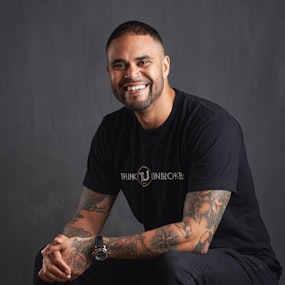
Michael Unbroken
Coach
Michael is an entrepreneur, best-selling author, speaker, coach, and advocate for adult survivors of childhood trauma.
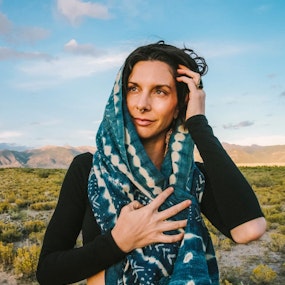
Cole Chance
Yoga Teacher
I've been a seeker all my life. It has brought me to the depths of addiction, to all corners of the world, and most importantly to the path of yoga. Through my practice I've begun to unravel, explore & understand the most fascinating of all landscapes – the inner one.
I believe in utilizing curiosity and intellect, both mental and somatic, to peel back our many layers and to find more freedom in our lives. My teachings are composed of playful and creative sequencing, Yoga and Buddhist philosophy, and a bedrock of compassionate self-inquiry.
I hail from ATX, though I am currently based between Bali + Australia. In addition to my online classes over on YouTube & here on CCY Studio, I leads retreats & trainings around the world, I'm dedicated to addiction recovery advocacy and education, and I have an immense love for shaggy dogs and ice cream.
I also have deep gratitude for my many teachers on and off the mat including Gioconda Parker, Denise Payne, and Nikki Myers.
Welcome to The Think Unbroken Podcast!
Here are some of my favorite recent guests!



























